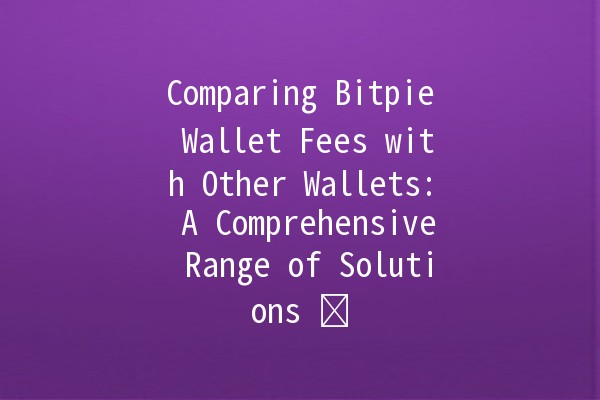




In the rapidly evolving world of cryptocurrency, choosing the right wallet is crucial for the security and management of digital assets. One of the most important factors to consider is the transaction fee structure of different wallets. This article delves into the fee comparison of Bitpie Wallet versus other popular wallets in the market, providing practical insights for users looking to optimize their cryptocurrency transactions.

Wallet fees entail the costs associated with using a digital wallet for transactions, including sending, receiving, storing Cryptocurrency, and providing additional services. Typically, these fees can be categorized into:
Transaction Fees: Fees paid to miners to process and confirm transactions on the blockchain.
Withdrawal Fees: Charges imposed by wallets for withdrawing cryptocurrencies to external addresses.
Conversion Fees: Fees that occur when swapping one cryptocurrency for another within the wallet.
Understanding these fees will allow users to make informed choices and potentially save money in the long run.
Different wallets have various fee structures, which can impact the overall cost of transactions. Some wallets charge fixed fees, while others use a percentagebased system depending on the transaction amount. Notably, some wallets offer free transactions but may charge higher conversion or withdrawal fees. Understanding these nuances can help users select the most costeffective option.
Bitpie Wallet is a multicurrency wallet known for its userfriendly interface and strong security features. It supports various cryptocurrencies and offers posttransaction notifications, making it easier for users to track their activities.
Transaction Fees: Bitpie utilizes dynamic fee structures, meaning fees can vary depending on network congestion.
Withdrawal Fees: Generally lower than many competitors, encouraging frequent use.
Conversion Fees: Users may incur additional charges when converting cryptocurrencies.
Let's compare Bitpie Wallet with some of its competitors to see how its fees stack up.
Transaction Fees: Typically higher, especially for smaller transactions.
Withdrawal Fees: Fixed fees regardless of transaction size.
Conversion Fees: Can be quite steep, especially compared to Bitpie.
Example: For a $100 transaction, Coinbase might charge around $23 in fees.
Transaction Fees: Offers competitive rates but can vary based on the currency used.
Withdrawal Fees: Fees depend on the cryptocurrency; generally higher than Bitpie.
Conversion Fees: Known for lower fees compared to some platforms, but not the lowest.
Example: For a $100 transaction, Binance might charge approximately $11.
Transaction Fees: Uses a percentagebased fee, making it ideal for larger transactions.
Withdrawal Fees: Similar to Bitpie but varies by cryptocurrency.
Conversion Fees: Slightly higher fees, but the interface is powerful and userfriendly.
Example: For a $100 transaction, Exodus may charge around $
| Wallet | Transaction Fees | Withdrawal Fees | Conversion Fees |
|||||
| Bitpie | Dynamic (low) | Low | Moderate |
| Coinbase | Fixed (higher) | Fixed (higher) | High |
| Binance | Competitive | Varies | Low |
| Exodus | Percentage | Moderate | Moderate |
Transaction fees can fluctuate significantly based on network activity. Users should monitor network congestion and execute transactions during offpeak times to minimize fees.
Example: Using a fee estimation tool can help identify the best times for transactions.
Some wallets, like Bitpie, offer options to adjust fees based on how quickly users desire a transaction to be confirmed.
Example: If users can wait longer for a transaction, selecting the 'slow' option can drastically reduce fees.
Since many wallets have a minimum fee per transaction, it’s more economical to consolidate assets and make fewer, larger transactions.
Example: Instead of making ten $10 transactions, making one $100 transaction can result in lower overall fees.
Some wallets offer promotions to reduce transaction fees for a limited time or under certain conditions. Keeping an eye on such offers can lead to significant savings.
Example: Bitpie may have times where transaction fees are reduced, making it beneficial to plan transactions around these times.
Certain wallets provide loyalty programs that reward users with reduced fees based on transaction history or holding of specific coins.
Example: Engaging in such programs may lead to a permanent reduction in fees for consistent users.
Choosing the right wallet is essential for anyone engaging in cryptocurrency transactions, and understanding the fee structures of different wallets can greatly influence overall costs. By comparing Bitpie Wallet's fees with those of popular competitors and considering the practical tips provided, users can save money and optimize their cryptocurrency experience.
Transaction fees in Bitpie Wallet are dynamic, which means they can change depending on network conditions. Generally, these fees are lower than those of many competing wallets, making Bitpie an economical choice for users.
Compared to Coinbase, Bitpie Wallet often has more favorable transaction and withdrawal fees. Coinbase tends to charge higher fixed fees and conversion fees, especially for smaller transactions.
Bitpie Wallet is transparent about its fees. Users should review the wallet's fee policy to understand any potential costs, especially related to conversions and transaction speeds.
Yes, users can reduce fees by timing their transactions, using fee adjustment tools, and consolidating their transactions into larger amounts.
Absolutely. Bitpie Wallet provides a userfriendly interface and a wealth of resources, making it accessible for cryptocurrency beginners while maintaining advanced features for seasoned users.
For any inquiries regarding fees or other walletrelated questions, users can visit Bitpie’s official support page or reach out through their customer support channels.
By understanding wallet fees and applying the practical tips shared, users can enhance their cryptocurrency management experience while keeping costs low.